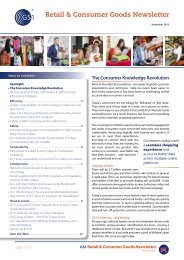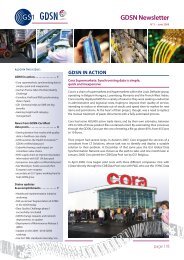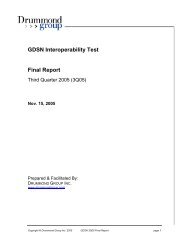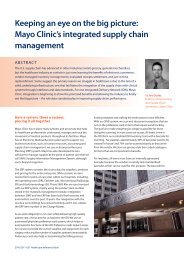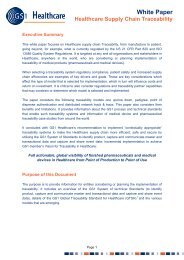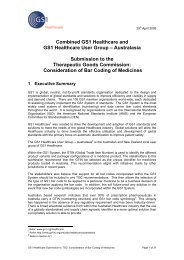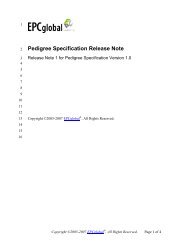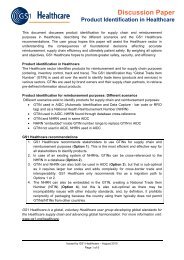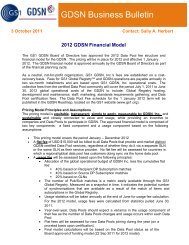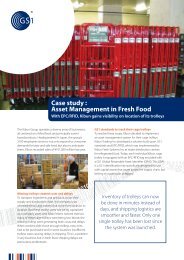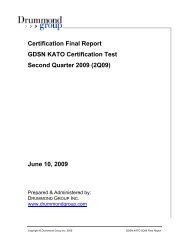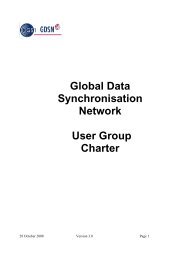GDSN Newsletter No. 2 - GS1
GDSN Newsletter No. 2 - GS1
GDSN Newsletter No. 2 - GS1
Create successful ePaper yourself
Turn your PDF publications into a flip-book with our unique Google optimized e-Paper software.
<strong>GDSN</strong> <strong>Newsletter</strong><br />
no. 2 – September 2008<br />
Also in this issue:<br />
<strong>GDSN</strong> in action................ 1<br />
• Synchronising data at Kraft Foods: an<br />
ongoing journey<br />
• Coop and Mars: committed to global<br />
data synchronisation<br />
• Global gdsn Healthcare pilot<br />
successfully completed<br />
• Uk survey results reveal importance of<br />
data quality programmes<br />
News from <strong>GDSN</strong>-Certified<br />
data pools .................... 3<br />
• Data is foundational: synchronising<br />
hardlines with big hammer<br />
• Commport in canada expecting<br />
a great 2008<br />
• Ghx to become gdsn-certified data<br />
pool to accelerate use of gs1 standards<br />
in healthcare<br />
Status updates<br />
& accomplishments ........... 5<br />
• First results from Project etoile:<br />
“gdsn works.”<br />
• Call to action: gsmp Healthcare gdsn<br />
extension work group<br />
• Preparing gdsn for future expansion<br />
Access a wide variety of downloadable<br />
resources and information<br />
www.gs1.org/gdsn<br />
<strong>GDSN</strong> in action<br />
Synchronising data at Kraft Foods:<br />
an ongoing journey<br />
Jochen Rackebrandt of Kraft Foods, spoke at the <strong>GS1</strong> General Assembly in May<br />
2008 where he shared the history of data synch at Kraft, which he qualified as a<br />
“journey” that is still underway:<br />
1 st US<br />
Explanatory of<br />
Data Exchange<br />
(UCCnet)<br />
Equity Investor in<br />
Transora<br />
(now 1Sync)<br />
Industry Driven<br />
Kraft Driven<br />
1999 2000 2001 2002 2004 2005 2007<br />
B2B Exchanges<br />
Heat Up!<br />
1 st Live Trading<br />
Partner – Shaws<br />
(Supervalu<br />
Division)<br />
GSMP Facilate’s<br />
Global Industry<br />
Standard<br />
1 st <strong>GDSN</strong><br />
Standards<br />
Adopted<br />
Internal<br />
Development<br />
begins – Quest<br />
for GDS Platform<br />
1 st Europe<br />
Trading<br />
Partnership<br />
established<br />
Ongoing<br />
Expansion and<br />
Partnership with<br />
Etoile<br />
Currently, Kraft is live with GDS is 12 countries, with a great deal of future potential.<br />
In the Americas, Kraft has full catalogue implementations with major customers in<br />
both the U.S and Canada; and more limited activity in Mexico and South America.<br />
In Europe, Kraft is using <strong>GDSN</strong> with customers in France, Belgium, Netherlands,<br />
Italy and U.K. with the Kraft Global System, and using local Data Pools in Germany,<br />
Finland, Denmark, Sweden with local Kraft systems. With their “Project Etoile”<br />
partners, Kraft is developing implementation plans for Spain and exchanging test<br />
data with Makro in U.K. They are also exploring opportunities in Russia.<br />
Kraft has an end-to-end GDS Process Flow, which is built around master data that<br />
has a common infrastructure. There is continuous harmonisation of data by one data<br />
owner with one internal and external feed; and there is also<br />
at Kraft a true effort to provide certified data quality<br />
via ongoing compliance tracking against<br />
policies as well as periodic audits.<br />
page 1/5
There is in fact a data certification pilot that is underway at<br />
Kraft in the US as an ongoing process through which the values<br />
of key product attributes are verified through sampling<br />
and inspection, in order to continuously understand and<br />
track the accuracy of a product at any stage in its development.<br />
Kraft began with a data accuracy audit as this “point in<br />
time” verification of product attributes is a key starting point<br />
for gauging data quality. 4,000 cases of samples (2,000 SKUs)<br />
from multiple manufacturing plants were audited, with nearly<br />
150 attributes collected<br />
for all package levels:<br />
case, inner pack, even<br />
each unit.<br />
“GDS will not work when<br />
companies are not doing<br />
their homework.”<br />
The audit confirmed<br />
that many inaccuracies<br />
exist in weights and dimensions; and proved that poor data<br />
quality causes inefficiencies. For example, one setup error in<br />
a product specification impacts 20 functions. The audit allowed<br />
Kraft to gain valuable experience, identify values for<br />
“new” attributes not currently maintained, and perhaps most<br />
importantly, obtain senior management awareness, commitment<br />
and funding.<br />
Among some of the many lessons learnt in the data<br />
certification audit:<br />
• Products need to be grouped and harmonised by “family,”<br />
whether it be brand, consumer unit, dimensions or<br />
functional name<br />
• Consistent certification environments and methods must<br />
be utilised: the same tools at every collection site, the<br />
same processes for measuring<br />
• Education and Training are essential<br />
• Internal Master Data certification indicators (such as<br />
certification date and status) are critical to maintaining<br />
and tracking data quality<br />
“Global Data Synchronisation will not work when companies<br />
are not doing their homework,” Jochen noted in conclusion,<br />
adding “Kraft is committed to working hand-in-hand with<br />
its trading partners to drive mutual data synchronisation<br />
benefits.”<br />
COOP and Mars: committed to global data<br />
synchronisation<br />
Coop is a Swiss cooperative which operates the second largest<br />
supermarket chain in Switzerland. Close to its customers and<br />
organised in five sales regions, Coop operates over 1,500<br />
stores and has a workforce of more than 48,000, making it<br />
the country’s third-largest employer. Coop is a market leader<br />
in environmentally friendly and fair-trade products.<br />
Mars, Inc. is a worldwide manufacturer of confectionery, pet<br />
food and other food products with US$25 billion in annual<br />
sales in 2007 and 48,000 associates. Headquartered in<br />
McLean, Virginia, U.S., the company is entirely owned by the<br />
Mars family, making it one of the largest privately owned U.S.<br />
corporations.<br />
Both companies are committed to global data synchronisation.<br />
Coop is aiming to be synchronising data with 70 business<br />
partners by the end of 2008; Mars is live with various U.S.<br />
customers (including Wal-Mart and Wegmans) with petfood<br />
at COOP Italy, with snackfood and food at COOP Switzerland;<br />
and is performing<br />
tests with Makro in<br />
the UK. At the <strong>GDSN</strong><br />
Summer Meeting in<br />
June, Simone Sporing<br />
from COOP<br />
Switzerland and Martina Gerndt from Mars Europe spoke<br />
about the trustful relationship between their companies<br />
which enabled a true collaborative effort.<br />
“For a <strong>GDSN</strong> programme to be<br />
successful, a special commitment<br />
to data quality is a must.”<br />
In their work on GDS, the two companies have seen the many<br />
benefits of global data synchronisation, such as integrated<br />
and automated processes; highly improved data quality and<br />
therefore reduced out of stocks, reduced warehouse and<br />
distribution costs and reduced financial reconciliation time<br />
and cost; increased speed to market and therefore better<br />
shelf availability, especially if there are last minute changes;<br />
and one single source of data entry leading to improved<br />
information productivity.<br />
They have also learnt a number of important lessons. For<br />
example, they feel that for successful <strong>GDSN</strong> projects, a special<br />
commitment to improve data quality is a must; as are lean<br />
processes that align information, people and technology. The<br />
companies find it is wise to start with the smallest number of<br />
attributes for a fixed number of items, and to thoroughly test<br />
the connectivity between the datapools before beginning.<br />
Global <strong>GDSN</strong> Healthcare pilot successfully<br />
completed<br />
The Healthcare sector is facing inaccurate or bad data at many<br />
points in the supply chain. These do not only add cost (e.g.,<br />
inefficiencies, manual work-arounds), but may also impact<br />
patient safety (disruptions may result in the unavailability of<br />
products). The Global Data Synchronisation Network (<strong>GDSN</strong>)<br />
allows the sharing of reliable master data between the supply<br />
and demand functions. The objectives of this Healthcare<br />
pilot study were to demonstrate how the <strong>GDSN</strong> supports<br />
the Healthcare supply chain and product data needs (data<br />
flow, data standards, data accuracy and product and location<br />
identification) and to demonstrate how the <strong>GDSN</strong> works<br />
across international boundaries (interoperability among data<br />
pools in different countries/continents).<br />
<strong>GDSN</strong> <strong>Newsletter</strong><br />
<strong>No</strong>. 2 – September 2008 page 2/5
“The main problem today, related to master data, is the lack<br />
of consistent data standards which are causing inefficiency in<br />
the supply chain. Without standards it is almost impossible to<br />
streamline electronic processes”, said Volker Zeinar, B.Braun,<br />
“We also want to avoid uploading data again and again.<br />
We trust the methodology of <strong>GDSN</strong> and are convinced that<br />
this model has the potential to become a success story in<br />
Healthcare.”<br />
“Premier has learnt, from this pilot, that the technology<br />
works in various settings and that we are in a good position<br />
to connect to and receive data from the <strong>GDSN</strong>”, said Lance<br />
Richey, Premier, Inc. “We have also learnt that the content of<br />
the data received varies depending on the supplier. We will<br />
work with our suppliers and the industry to improve and<br />
standardise the attributes flowing through the <strong>GDSN</strong>. A high<br />
level review of just two of the processes within Premier will<br />
net a saving of US$250,000 in labour in the first year”.<br />
Participating suppliers were Baxter, B.Braun and BD (Australia).<br />
Participants from the demand side were Amerinet, Ascension,<br />
Mayo, Premier and Sister of Mercy (USA). The pilot team<br />
consisted of representatives from 1SYNC, US Department of<br />
Defense, <strong>GS1</strong>net (<strong>GS1</strong> Australia <strong>GDSN</strong>-certified data pool),<br />
<strong>GS1</strong> US and Ontuet.<br />
UK survey results reveal importance of Data<br />
Quality Programmes<br />
To ascertain the state of data accuracy in today’s UK supply<br />
chain, and gain a true idea of the extent of the problem, the<br />
<strong>GS1</strong> UK Data Synchronisation Group recently carried out a<br />
survey of UK retailers, suppliers and food service operators.<br />
Participants included<br />
ASDA, Makro,<br />
Cadbury, Boots,<br />
Compass, Woodwards,<br />
Reckitt<br />
Benckiser, Unilever,<br />
Procter & Gamble,<br />
Heinz, Nestlé, R&R<br />
Ice Cream, L’Oréal<br />
and Mars.<br />
The survey results<br />
demonstrated the<br />
extent of the work<br />
to be done by both retailers and suppliers to improve the<br />
processes that deliver supply chain ultimately the data quality<br />
itself. Consider these figures: 30% of the product information<br />
resident in retail catalogues is incorrect. On average,<br />
data errors cost organisations £40 per item to be manually<br />
corrected. The biggest worry over data quality that emerges<br />
from the survey is that data is not being delivered by suppliers<br />
in a timely manner before a new product launch. Ultimately,<br />
the cost of the top four retailers of the resulting data<br />
errors and the shelf unavailability is up to £10 million a year,<br />
this equates to £43 million of sales.<br />
Read the complete report in the Summer edition of GSQ,<br />
(http://edition2a.intellimag.com/?id=gsqsum08&page=26)<br />
the quarterly magazine from <strong>GS1</strong> UK.<br />
News from <strong>GDSN</strong>-certified data pools<br />
Data is foundational: synchronising Hardlines<br />
with Big Hammer<br />
with 5,500 suppliers and over 300,000 product items, which<br />
include 21 million product attributes.<br />
Jay S. Yanko, Director of Global Data Synchronisation at<br />
Edgenet / Big Hammer Data, puts his company’s philosophy<br />
bluntly: “Data is foundational, and as a result, <strong>GDSN</strong> is<br />
important to us and to our customers.”<br />
Big Hammer Data is a <strong>GDSN</strong>-certified data pool and a whollyowned<br />
subsidiary of Edgenet, Inc, a Nashville, Tennessee<br />
company providing data, media and software solutions. The<br />
firm has a 15-year heritage in building supplies retail and<br />
manufacturing. The Big Hammer Hardlines Marketing Data<br />
Pool is the largest private data pool in the hardlines industry,<br />
Beyond just a method of identifying products and packaging,<br />
Big Hammer knows that global data synchronisation<br />
provides a common ground for accurate information used<br />
in optimisation efforts<br />
and cost reduction<br />
programmes.<br />
“Create an internal<br />
vision and involve all the right<br />
stakeholders, from the start.”<br />
<strong>GDSN</strong> <strong>Newsletter</strong><br />
<strong>No</strong>. 2 – September 2008 page 3/5
The hardlines industry faces a number of challenges:<br />
They exist in what Yanko calls “a CPG World,” a difficult<br />
task considering the very different nature of the business.<br />
Hardlines means large ticket items and highly configurable<br />
products and projects; very diverse suppliers; and a current<br />
focus on increasing sales, improving the customer experience<br />
and boosting follow-through and communication.<br />
When asked about what advice he could give to companies<br />
beginning a data sync programme, Jay Yako replied that<br />
they should start by creating an internal vision and involving<br />
all the right stakeholders, including people from Sales and<br />
Marketing, Product Development, Logistics and Business,<br />
because GDS is not a silo activity. Companies engaging this<br />
process need to know what product data means to their<br />
business and to their trading partner’s business, because. A<br />
data quality programme is also important.<br />
For more information, visit www.bighammer.com<br />
Commport in Canada expecting a great 2008<br />
Commport provides its<br />
customers with Electronic<br />
Data Interchange (EDI) and<br />
Electronic Commerce (EC)<br />
solutions; data warehousing;<br />
and complete customer care<br />
facilities. A privately owned corporation based in Ontario,<br />
Canada, Commport serves firms located across the <strong>No</strong>rth<br />
American continent. Commport has been promoting the<br />
paperless work environment for over 15 years.<br />
Commport became a <strong>GDSN</strong>-certified data pool in 2005. The<br />
first few years were slow, but Alison Bartlet, the company’s<br />
Director of Marketing, says that 2008 is off to a fantastic<br />
start: “Sales are up by 250%, mostly thanks to our efforts on<br />
a few key initiatives including the Book industry, our efforts<br />
to reach out to <strong>GDSN</strong> Retailers and our work with Canada’s<br />
largest industrial supplies distributor.”<br />
The company offers its customers a core <strong>GDSN</strong>-certified data<br />
pool solution as well as a range of value-added services that<br />
are customised, flexible, and multi-lingual.<br />
Commport is active in a market where there is an established<br />
local closed data pool in operation, which presents a<br />
challenge, as does the fact that they are a commercial<br />
enterprise in a field dominated by not-for-profit data pools.<br />
“2008 is off to a fantastic start!”<br />
For more information, visit www.commport.com or<br />
www.cgsdatapool.com<br />
GHX to become <strong>GDSN</strong>-certified data pool to<br />
accelerate use of <strong>GS1</strong> Standards in Healthcare<br />
GHX has announced plans to become part of <strong>GS1</strong>’s Global<br />
Data Synchronisation Network (<strong>GDSN</strong>) as a <strong>GDSN</strong>-certified<br />
data pool for the Healthcare industry. At the core of all GHX<br />
services is an Internet-based trading exchange, which is<br />
open to, and owned by, representatives from all members of<br />
the Healthcare supply chain including; providers, suppliers,<br />
distributors and group purchasing organisations (GPOs).<br />
Globally, GHX is connected to over 5,000 hospitals in <strong>No</strong>rth<br />
America and nine European countries. This includes hospitals<br />
representing more than 80% percent of the licensed beds in<br />
the U.S. and 350 suppliers that sell more than 85% of the<br />
products purchased regularly by hospitals.<br />
“The Healthcare<br />
industry has recognised<br />
that adopting<br />
<strong>GS1</strong> Standards<br />
for product and<br />
organisational<br />
identification and<br />
synchronising data<br />
through the <strong>GDSN</strong><br />
can address many of<br />
the most challenging<br />
problems facing<br />
the healthcare<br />
supply chain,” Bruce<br />
Johnson, GHX Chief<br />
Executive Officer.<br />
“GHX is pleased to<br />
help accelerate <strong>GS1</strong><br />
Standards adoption<br />
by not only becoming a data pool, but also through our<br />
membership and participation in global and local <strong>GS1</strong> working<br />
groups.” Many of GHX’s 20 equity owners are already engaged<br />
in <strong>GS1</strong> Healthcare and encouraged GHX to become<br />
part of the <strong>GDSN</strong> to leverage what the Healthcare industry<br />
has already built to facilitate more accurate electronic commerce<br />
and communication.<br />
GHX will build out its current infrastructure to meet specific<br />
<strong>GS1</strong> <strong>GDSN</strong> requirements, with certification as a data pool<br />
expected in 2009.<br />
Equity owners of GHX are Abbott Exchange, Inc.,<br />
AmerisourceBergen Corp., Baxter Healthcare Corp., BBraun<br />
Medical Inc., Becton, Dickinson & Co., Boston Scientific Corp.,<br />
Cardinal Health, Inc., Covidien, C.R. Bard, Inc., Fisher Scientific<br />
International, Inc., GE Healthcare, HCA, Johnson & Johnson<br />
Health Care Systems Inc., McKesson Corp., Medtronic USA,<br />
Inc., Owens & Minor, Premier, Inc., Siemens, University<br />
HealthSystem Consortium and VHA Inc.<br />
For more information, visit www.ghx.com<br />
<strong>GDSN</strong> <strong>Newsletter</strong><br />
<strong>No</strong>. 2 – September 2008 page 4/5
Status updates & accomplishments<br />
First results from Project Etoile: “<strong>GDSN</strong> works.”<br />
Project Etoile is the premier <strong>GDSN</strong> adoption programme<br />
backed by the Boards of GCI, <strong>GS1</strong> and <strong>GDSN</strong>, Inc. Over the<br />
course of 2007, 8 data pools, 12 retailers<br />
and 25 manufacturers in France, Germany,<br />
Netherlands, Spain, the UK and the USA<br />
participated in Etoile.<br />
Etoile 2007 demonstrated that the <strong>GS1</strong><br />
<strong>GDSN</strong> infrastructure is in place and<br />
that it works: trading partners who<br />
are internally aligned and focused on<br />
executing data synchronisation through<br />
the <strong>GDSN</strong> are seeing results. It proved<br />
that through the existence of the <strong>GS1</strong><br />
<strong>GDSN</strong>, businesses can achieve growth,<br />
realise efficiencies and cost savings, and see business process<br />
improvements, even from the very first synchronisation event.<br />
As just one example, active trading partner synchronisation<br />
connections by participants in Etoile 2007 increased from 34<br />
to 100 in one year.<br />
Participants found that companies or regions just beginning<br />
the global data synchronsation journey learnt different<br />
lessons than those companies with some level of GDS<br />
experience. For example, new trading partners connecting<br />
to the <strong>GDSN</strong> learnt that acceptance and use of it depends<br />
heavily on retailer commitment and readiness, and that<br />
successful implementation of GDS projects is complex to<br />
manage and requires support from top level executives, as<br />
well as involvement and engagement from every level of the<br />
organisation. The project also revealed that in order to truly<br />
eliminate disruptions in data flow enabled by GDS, successful<br />
companies have changed their internal systems to integrate<br />
information from <strong>GDSN</strong> directly into back-end systems.<br />
The earlier adopters learnt that proactive suppliers benefited<br />
from more <strong>GDSN</strong> connections with retailers than those who<br />
wait for retailer mandates. They saw that sharing accurate<br />
product data is a strategic imperative. Etoile 2007 also<br />
demonstrated that the internal business process automation<br />
made possible by full implementation of the <strong>GDSN</strong> allowed<br />
them to eliminate non-value added work.<br />
In 2008, Etoile is continuing to focus on connectivity<br />
and interoperability and beginning to address the other<br />
two project components: Data Quality Key Performance<br />
Indicators (KPIs), and Business Process Automation<br />
improvements. Etoile will also expand to include Belgium/<br />
Luxembourg and China.<br />
For more information, read the Etoile 2007 Report on lessons<br />
learned at http://www.gs1.org/docs/gdsn/Etoile_2007_<br />
Report_Lessons_Learned_<strong>GDSN</strong>_and_Interoperability.pdf.<br />
Call to Action:<br />
GSMP Healthcare <strong>GDSN</strong> Extension Work Group<br />
<strong>GS1</strong>’s Global Standards Management Process, or GSMP,<br />
has issued a call-to-action for the GSMP Healthcare <strong>GDSN</strong><br />
Extension Work Group, in order to define additional<br />
healthcare data requirements and to build a Healthcare<br />
Extension for the <strong>GDSN</strong>.<br />
Once the new data requirements are properly defined, including<br />
supporting attributes and rules, they will become part of<br />
a Healthcare Extension for the <strong>GDSN</strong> and will enhance the<br />
<strong>GDSN</strong>’s ability to support the needs of the global healthcare<br />
sector. For more information, contact Peter Alvarez at peter.<br />
alvarez@gs1.org or read the Call To Action itself at http://<br />
www.gs1.org/services/gsmp/involve/call_to_action.html.<br />
Preparing <strong>GDSN</strong> for future expansion<br />
<strong>GS1</strong> <strong>GDSN</strong>, Inc. and GSMP published a position statement in<br />
support of a project created to assess opportunities to improve<br />
the flexibility of the infrastructure of the <strong>GS1</strong> Global<br />
Data Synchronisation Network (<strong>GDSN</strong>) and develop means to<br />
facilitate future expansion of the network. Given the <strong>GDSN</strong> focus<br />
is on growth and adoption, the network must ensure it is<br />
positioned to accommodate the additional growth and associated<br />
volume. A more flexible trade item data model would<br />
provide the opportunity to more efficiently support <strong>GDSN</strong><br />
expansion, in particular to easily enter into new sectors or adjacent<br />
sectors, increasing the adoption of <strong>GDSN</strong>, particularly<br />
by new industry sectors and geographies, to reduce the time<br />
required to introduce new attributes or code values into the<br />
network, and to minimise the re-mapping effort required to<br />
implement new versions of the standard. <strong>GS1</strong> <strong>GDSN</strong>, Inc. and<br />
GSMP are committed to work closely with the community to<br />
facilitate the development and a smooth implementation of<br />
a new and much needed trade item data model.<br />
Read the complete position statement at http://www.<br />
gs1.org/docs/gdsn/<strong>GDSN</strong>_GSMP_Position_Statement_<br />
Modular_Item.pdf.<br />
The <strong>GDSN</strong> <strong>Newsletter</strong> is a publication of:<br />
<strong>GS1</strong> <strong>GDSN</strong><br />
Blue Tower, Avenue Louise 326, b10<br />
BE 1050 Brussels, Belgium<br />
T +32 (0)2 788 7800<br />
F +32 (0)2 788 7899<br />
Publisher: Sally Herbert, sally.herbert@gs1gdsn.org<br />
Editors: Jan Denecker, jan.denecker@gs1.org<br />
Visit: www.gs1.org/gdsn<br />
page 5/5



